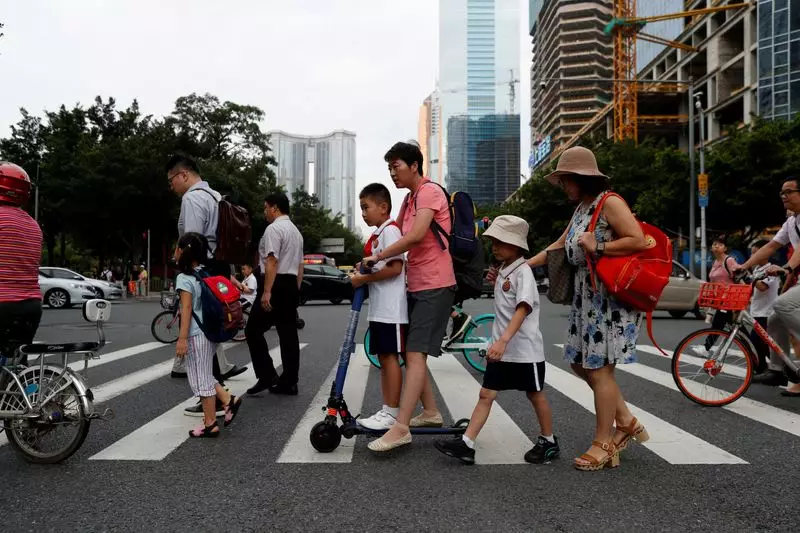In recent months, China’s private tutoring industry has begun to reestablish itself, signaling a possible revival of a sector that faced severe limitations under stringent government regulations. After a crippling three-year crackdown, analysts and industry insiders reveal that Beijing is now subtly lifting its regulatory grip on tutoring businesses in a bid to stimulate the economy. While formal policy changes remain elusive, nuanced indications from policymakers suggest a desire to rejuvenate this essential service, responding to the pressing demand from parents desperate to support their children’s education in a highly competitive environment.
The previous regime of stringent regulations, notably the “double reduction” policy enacted in 2021, effectively curtailed for-profit tutoring in core subjects. This initiative was intended to alleviate the financial and emotional burdens on families navigating China’s demanding educational landscape. Consequently, the policy decimated the sector, causing nearly $100 billion in market value loss and the elimination of thousands of jobs as major players like New Oriental and TAL Education Group shrank in response.
Despite past hurdles, the demand for tutoring services has not waned; families are still eager to invest in their children’s academic success. Interviews conducted with parents reflect a slow but notable shift towards more open educational environments. One concerned parent recounted how, post-regulation, tutoring services operated with more discretion, often shrouding classes behind closed curtains. Presently, however, services appear to be embracing transparency once again, engendering a sense of normalcy that many parents yearn for as they navigate the complexities of their children’s education.
The complexities of China’s educational demands have not lessened, forcing parents to explore alternatives to support their children’s academic journey. As traditional avenues of assistance became increasingly difficult to access, many families resorted to tutoring as an indispensable framework for nurturing their children’s academic potential. This landscape, fraught with pressure, often fuels feelings of inadequacy among parents, who contend with their own aspirations and the competitive expectation placed upon their children.
While the Ministry of Education has largely remained silent on the evolving landscape of the tutoring industry, statements from education stakeholders hint at a growing willingness to ease stringent restrictions. Recent government announcements—including the incorporation of educational services within broader economic initiatives—indicate an emerging consensus around the importance of the tutoring sector for job creation and economic stability. This tacit acceptance marks a departure from previous rigidity and suggests a revised approach that prioritizes stability over strict control.
Industry experts foresee an environment increasingly conducive to growth. The State Council’s recent inclusion of education services in a 20-point plan underscores this sentiment, providing a glimmer of hope for education companies facing steep challenges in navigating an uncertain future. As openings expand, previously defunct businesses are beginning to regroup, with many companies actively seeking to rehire talent and adapt to the new normal.
The tutoring sector is also actively redefining its service offerings, creatively adapting curricula to sidestep regulatory scrutiny. Private tutoring companies have demonstrated an impressive ability to innovate, often repackaging subjects under names designed to circumvent existing bans. For instance, traditional subjects like mathematics have been relabeled as “logical thinking” courses or similarly coded programs, enabling operators to creatively survive and cater to parental demand without incurring penalties.
Parents faced with the dilemma of navigating the complexities of their children’s education often find themselves compelled to make difficult choices between expensive tutoring and their personal time. A mother in Shanghai reflected on the burden of rising private tutoring costs, sometimes exceeding 800 yuan per class, as she weighed the necessity of support against her own capabilities. This reality brings to light the ongoing struggles within the sector and highlights the critical need for intervention that balances regulation with the essential quality of educational assistance.
The future of China’s tutoring industry hangs in a delicate balance. Positive signs of early revival juxtaposed against the specter of past constraints underscore the complexity of the situation. Even as policies appear less rigid, uncertainty persists in the education landscape, with companies like New Oriental remaining cautious amidst ongoing regulatory ambiguities.
Ultimately, the revival of this critical sector will depend on sustained governmental support and dependent responses to the education system’s evolving challenges. As families continue to seek opportunities for academic reinforcement, the hope emerges that constructive policy adjustments will pave the way for a balanced partnership between regulation and educational necessity, fostering a more supportive environment for all stakeholders involved in China’s educational ecosystem.

